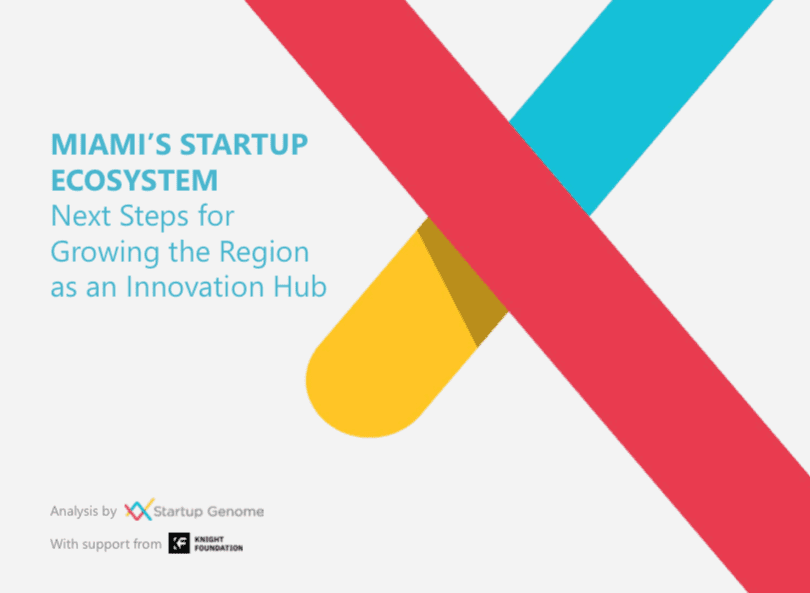By Nancy Dahlberg
It’s been a year since Startup Genome put Miami’s startup ecosystem on the global map for the first time. At that time, the Miami metro area cracked the organization’s top 30 ranking of startup ecosystems. Miami also ranked 7th globally for the number of female founders.
Since that report, the metro area had its best year on record for venture capital, drawing $2.4 billion in 2019, ranking South Florida 7th in the nation, according to the eMerge Insights 2019 Annual Report.
The Knight Foundation contracted with Startup Genome to take a closer look at the startup community. The result is a fresh Miami report that is being released today. Titled “Miami’s Startup Ecosystem: Next Steps for Growing the Region as an Innovation Hub,” the report is based on data collected in 2019, and to be sure the world has changed massively since then. But it’s also a moment to take stock of progress as the community charts the way forward.
 The insights drawn from this assessment are as relevant as ever, Knight Miami Program Director Raul Moas believes. Creating an inclusive community is essential if Miami’s startup ecosystem is to flourish, and the current climate offers both challenges and opportunities. “It is a natural moment for reflection and reorientation. We want to put [the report] out there and we are hoping what comes out of it is conversations in the community about the future of Miami’s startup ecosystem,” Moas added.
The insights drawn from this assessment are as relevant as ever, Knight Miami Program Director Raul Moas believes. Creating an inclusive community is essential if Miami’s startup ecosystem is to flourish, and the current climate offers both challenges and opportunities. “It is a natural moment for reflection and reorientation. We want to put [the report] out there and we are hoping what comes out of it is conversations in the community about the future of Miami’s startup ecosystem,” Moas added.
Knight chose to work with Startup Genome because the organization has an interesting methodology for measuring connectivity, an indicator of the importance of community and the local network in creating ventures, Moas said. “Because it is a primary goal of ours to improve connectiveness, the sense of community amongst the startup ecosystem here, we thought they would be a good partner.”
The Miami Metro area is in the second phase of a four-phase startup lifecycle – the Globalization phase, according to the report. It ranks slightly higher than similarly ranked ecosystems for the number of software startups, but lower for startup density. Miami founders also bootstrap their ventures at a higher level than their peers, indicating less familiarity with where to find capital. Miami has more accelerators but fewer local VCs than its peers, the report found.
On minority indicators, Miami shines. However, the report doesn’t offer relevant diversity data for our ecosystem because all minorities are combined and Hispanics are of course a majority here. Moas says that’s why Knight recently partnered with Sherrell Dorsey’s The Plug to gather and analyze data that will be relevant and enlightening.
Some of the key findings:
* On the measure of connectiveness, Miami has room to grow. By placing entrepreneurs at the center and better supporting their ability to build community with other founders, investors and experts, Miami would improve the ecosystem’s sense of community and retention of entrepreneurs, the report said.
The report uses Stockholm as an example of a connected ecosystem, where founders support one another and as a result startups grow faster and exits are strong. Knight’s support of Miami organizations such as Craftspeople and Will Weinraub’s LLC are aimed at helping build a sense of tribe among founders. “The data shows that that that kind of culture is paramount to startup success and community success as a whole, so this gives us a measure, a benchmark, so we can track improvement,” Moas said.
* Increasing the amount of funding available to early-stage startups would have positive effects downstream, closing funding gaps at the Series A stage and beyond, the report said. Miami lags its peers in early-stage funding per startup: $178K.
There is a lot of talk of a Series A gap, but “the challenge for Miami is really seed funding,” said Moas. “This gives Miami as a community a roadmap to really focus on the seed level. If we solve for that, we solve a really big portion of the funding gaps downstream.”
* Growing the number of startup employees who receive equity compensation could help with talent retention and give Miami the opportunity to grow more talent with startup growth experience.
According to the report, Miami lags in equity participation by a significant margin compared to its peers. Says Moas: “Many less Miami-based startups offer all of their employees equity compensation or stock participation. We hear a lot about the challenges of attracting or retaining talent in the market, and now we have for the first time a measure of not only how we are doing but how we are doing compared to ecosystems like Atlanta, Austin, etc and we have a ways to go as a community to make sure our startups have the compensation practices that are expected for an ecosystem to attract exceptional talent.”
* Globally connected ecosystems achieve greater reach, more fully realizing their potential. Diversifying Miami’s global footprint beyond Latin America and growing ties to top ecosystems would improve the flow of global knowledge coming to the region and increase overall scale-up potential, the report said.
Download the full report here.
Moas hopes the report helps to prompt a series of conversations about the future, informed by the data. The outcome of all these discussion can produce a list of priorities that various organizations can take on, he added.
One of those conversations is starting at noon today when Knight is hosting an online discussion titled “The Miami opportunity: Expanding access and advancing equity.” To register, click here.
READ MORE: 3 national ventures focused on ecosystem inclusion receive Knight funding. Let’s meet them
Follow @ndahlberg on Twitter and email her at ndahlbergbizgmail.com
- 8+ things to know in #MiamiTech: Dapta and Siprocal raise funding, plus news from Jeff Bezos, MoonPay, Sustainable Skylines, Freebee & more - April 11, 2024
- Slow start for Q1 South Florida VC but deal count showed strength. Here are the top deals. - April 11, 2024
- Bucking the trends, Miami Angels posted a record 2023, a strong start in ’24, and more - April 10, 2024





